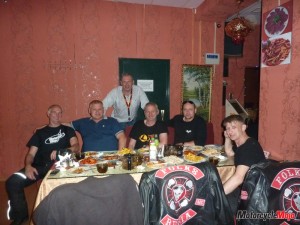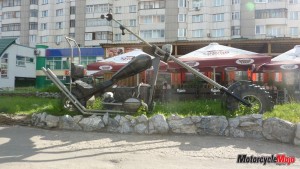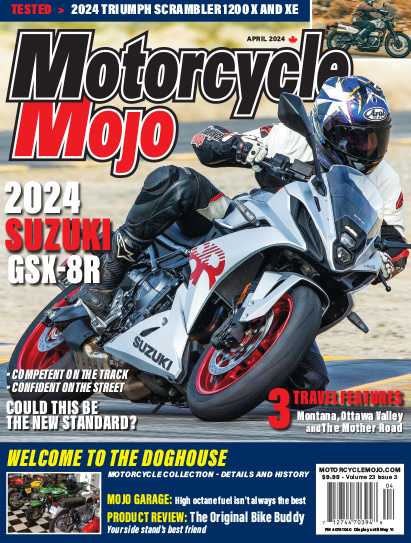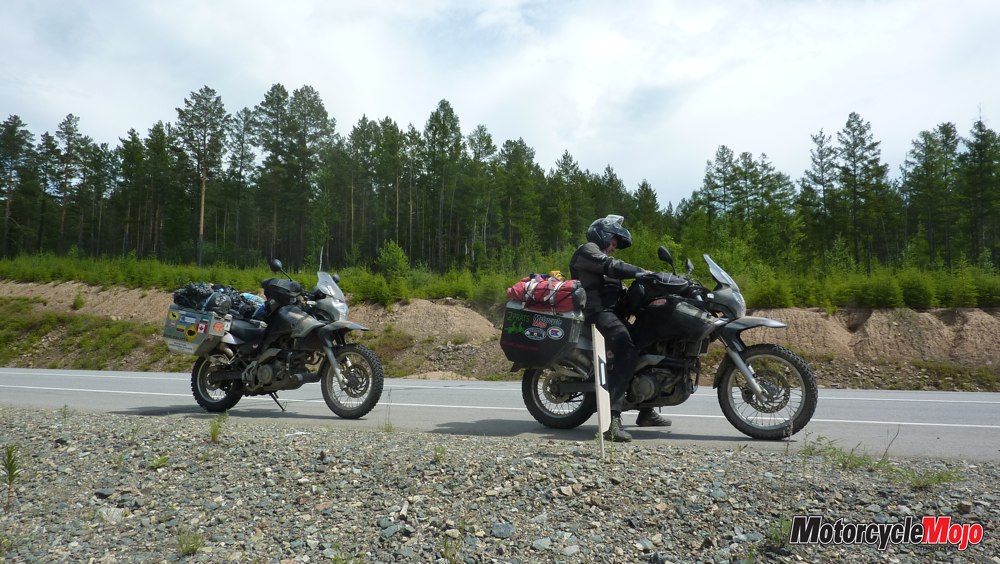A ride through Russia doesn’t have to include breakdowns, copious amounts of vodka and naked saunas with Hells Angels. Or maybe it does?
Clouds had been gathering all day, and now everything was muggy, grey and overcast. The light had gone flat as we approached the roadworks that stretched into the hills as they rose in front of us. And rain that had been threatening for the past two hours finally arrived. Mike slowed to a stop and surveyed the sea of red, muddy sand that flowed into the dark clouds on the horizon. I pulled up alongside him; his eyes said it all. We had been riding for nine hours, and enough was enough – it was time to stop.
“How about asking in that truck stop if there is a hotel nearby,” he said. I parked the bike in the fast-developing mud bath, dripped my way into the prefabricated café, and in my poor Russian, asked the waitress what I thought was, “How far guest house?” Being able to ask questions is useful, but it would be better if I were able to understand the answers, something I was incapable of after only a few days in Russia. We played a game of charades, and then she found a pen and paper so we could draw pictures and numbers. Eventually it dawned on me that I had asked, “How much is the guest house,” which was handy, because the café was also a motel.
We rode through the sticky mud of the roadworks the next day, made worse by constant overnight rain. In Russia, there are no detours for roadworks; they cut the damaged road up, throw some rocks and sand down, then get on with preparing for the asphalt while trucks, cars and motorbikes pass them by. When the mud is wet, it sticks to the bikes and your clothes, and when it’s dry, the trucks blind you with dust. You have to decide to stay well behind or overtake blind, a new form of Russian roulette. Twenty- or thirty-kilometre stretches of these are not uncommon.
 Mike and I were on the latest leg of our attempt to ride around the world from the United Kingdom, across North America and then Russia – approximately 20,000 kilometres in 91 days.
Mike and I were on the latest leg of our attempt to ride around the world from the United Kingdom, across North America and then Russia – approximately 20,000 kilometres in 91 days.
Six days earlier, we disembarked the ferry in Vladivostok, Russia, from South Korea, along with both of our Aprilia Pegaso Trail 660s, still bundled in their airfreight crates.
Unpacking the bikes in the dusty customs warehouse was our first experience of Russian hospitality, one that shaped how our trip would unfold. Russia has a lot of bike clubs, and a Vladivostok group, Folks Russia, had heard about us from a new friend we met on the ferry. They tracked us down via our agent, Svetlana, who informed us that they would like to meet us and show us around the city.
A Harley-Davidson pulled up outside the warehouse, the rider grinning from ear to ear. As he parked the bike, we saw all the badges on his denim vest. Most noticeable were the “full colours” patch on his back, and the “Support 81” badge. The bike group was Hells Angels.
But we were in a different world now. Dmitry, the vice president, showed us around the city, posed with passing families for photographs, and fed us. For the rest of that day, we were not allowed to pay for anything. The drinking eventually started once the bikes had been garaged, shortly after midnight. Russia has a strict zero tolerance when it comes to drinking and driving. Dmitry then gave us names and mobile numbers of various clubs and Hells Angels throughout Eastern Siberia.
Riding west across Russia, there is only one road, the Trans-Siberian Highway. Initially, it passes through towns and cities as you head north until just after Khabarovsk, near the easternmost point of China, when you turn left and cross the river into “Mordor,” as the wilder east is known to the inhabitants of the region. Here, the already thin population diminishes even more; towns and villages are hidden down dust tracks that wind away through the trees lining the road. The road itself is built up, raised about three or four metres above damp marshlands. Any thoughts we had of camping were dashed by our inability to get the bikes safely off the road and out of sight.
It is widely rumoured that the town of Mogocha has the last gas station before the long, 600-kilometre run to Chita. As we bounced down the pot-holed road, a member of the Iron Angels MC met us. They had been told we would be coming, so they were looking out for us.
 Two things are required for a true Russian experience – staying with a family, and taking a sauna. In Chita, a city in the middle of nowhere, we experienced both. Once more under the benevolent wings of Folks Russia from Vladivostok, who organized a group of young “free riders” – bikers not part of a recognized club – we were taken in by Boris and his mother Lillia in their stockaded wooden house on the outskirts of town. Here, we were introduced to new people every few seconds while Ivan, a trainee doctor who spoke very good English, interpreted both languages throughout the evening meal.
Two things are required for a true Russian experience – staying with a family, and taking a sauna. In Chita, a city in the middle of nowhere, we experienced both. Once more under the benevolent wings of Folks Russia from Vladivostok, who organized a group of young “free riders” – bikers not part of a recognized club – we were taken in by Boris and his mother Lillia in their stockaded wooden house on the outskirts of town. Here, we were introduced to new people every few seconds while Ivan, a trainee doctor who spoke very good English, interpreted both languages throughout the evening meal.
Food and vodka, they go together. Russian feasts comprise various small dishes of meat or vegetables with rice or pasta. Simple, but very tasty fare. Vodka drinking is compulsory, and Lillia, being ex-army, did not hold back on bringing the cold, clear liquid out of the freezer. We had intended to stay only one night, but once we were softened up by the free-flowing hooch, another night with a sauna thrown in was not to be refused.
The next day, we used Boris’s garage and tools for a bit of maintenance, followed by a tour of the town. It didn’t take long before the drinking started again, in the woods, with more vodka and an Uzbekistan BBQ organized by Ivan’s “uncle” Mohamed. Everywhere we went, people wanted to meet us, find out about our lives and ask what we thought of theirs.
Finally, around midnight, we arrived at the sauna in the backyard of a house on the banks of the river Chita. It was all warmed up and ready – all we needed to do was drink more vodka, strip off and get in. The heat was high, and peeva (beer) was poured on to give the steam flavour and aid the sweat. Ten minutes was enough – then a midnight streak to the river through bushes, diving blindly into dark, cold water, and then a slow walk past a line of drinkers back to the sauna. Then the birch twigs came out; a beating with these is supposed to help the blood flow. Mike was whipped by Nikolai, a naked, burly Hells Angel. Then when Mike returned the beating, Nikolai began shouting, “harder, harder!” It was too much for me, and I was doubled over with hysterical laughter. We continued in this way until the pre-dawn hours . . . I think. Early the next morning, having survived our third night of vodka abuse, we reluctantly said our farewells and pressed on west.
I always knew that Kazakhstan would be the place that broke my bike. But I didn’t expect it to happen less than two hours into the country. We had barely crossed the border and had stopped to view the vast, flat, open scrublands that now bounded the road, when a passing car pulled over and we were joined by three men. They were eager to find out our trip plans, and when we told them we were going to Semey, just inside the eastern edge of Kazakhstan, one of the men insisted that he get his brother to meet us at the police post outside the city, and he would show us to our hotel. Sure enough, we were met as promised and then led through the back streets over rough gravel roads, until my bike died. Suddenly there was no power, the engine just cut out. Our guide, Adilet, came back as I was taking the seat off to test the battery. There was just enough power to start the bike with the lights off and ride it to the hotel. We checked in, but Adilet would not let us pay. We dropped our gear in the room before commencing work on the bike. By the time we arrived at the parking lot, someone was already looking at it. Who needs breakdown insurance when you have the Siberian mafia watching your every step?
Adilet had called the local bike club and organized their electrician to come and look at the bike. He soon located a broken wire, admonished me for my poor maintenance, and fixed it. Then we were taken to their clubhouse so the drinking could start. By now, I really thought I knew how to handle the vodka. It is easy – you talk a bit, someone proposes a toast, you down it, eat something and then have a drink of non-alcoholic juice. I was in full swing with toasts of everlasting friendship, encouraged by the deputy mayor, who also turned up. Unfortunately, instead of drinking juice between shots, apparently, I was drinking beer. I still have no recollection of the events that may have taken place from 5:30 in the afternoon until 7:00 the next morning. Mike assures me we all went to a sauna and had a BBQ. Eventually I recovered, and we made our way to Almaty, on the Silk Road in the south of Kazakhstan.
As we arrived outside a hotel in the centre of Almaty, my bike died again. We stripped down the front of the bike to get at the ignition, and saw that a wire had come away from the contact on the ignition barrel. While I was explaining to the hotel staff that I needed a soldering iron, a motorcycle mechanic rolled past on his bike and told Mike he would return with one. There was always some form of “angel” to help us. My bike had over 70,000 km on the clock before starting the trip, but Mike’s had less than 15,000. The bikes are the same, only one year apart, so what happens to one could very well happen to the other. This also helps with carrying spare parts. Mike took the repair lesson – and the opportunity to “pre-fix” his ignition with some epoxy resin – before getting underway again. The hotel manager also rode a bike, and could not do enough to help us – including a free meal of quality steak and a full load of water and fruit for our journey.
We were finally able to wild-camp; getting off the road was easy, finding somewhere to remain unseen was harder. At one overnight stop in a disused roadworks gravel pit, we were visible to cars passing from the nearby village. A battered white car drove past a few times and then stopped, all four doors opened, and seven young lads clambered out. All we could do was smile, wave, say hello and let them take pictures. They were fascinated by the tents and kept looking inside. Curiosity fulfilled, they all climbed back in the car and drove away. We were not disturbed again that night. A source of fun, strangely enough, were the police posts that are a feature of Siberian towns. Feared by some, but an amusement for us. On many occasions, especially when in Kazakhstan, we would be signaled to stop by the waving of a white baton. The policeman would then march over to us, completely expressionless, salute, then crack a smile and offer his hand to be shaken. He would then start asking about the bikes or where we were going.
In the 40-plus Celsius heat of Kazakhstan, we struggled to remain polite and conversational, as this could occur three times in each town – at the entrance, the centre and the exit. For four days, my bike behaved. Then, in the middle of a Kazakhstan desert, the fuel pump failed. We had just spent an hour talking to a young French lad, Baptiste – who was going the other way on an XT250 – and had said our goodbyes when it happened. Baptiste looked more devastated than me. He had chosen not to use a fuel-injected bike for this reason. I wasn’t fazed; I opened a pannier and pulled out the spare pump I had been carrying for three years and over 57,000 kilometres “just in case.” Baptiste watched as we stripped the tank off the bike, replaced the pump, and ninety minutes later I ran around the bike whooping while doing a happy dance. It also caused much amusement when I turned the tank over with hot gas in it – it spurted gas all over me in the fashion of a baby boy when you change his diaper. In Russia the roads were harsh, but in Kazakhstan they were sometimes nonexistent, and they took their toll on my bike. In addition to the breakdowns, there was no damping left in my rear shock. My tire was bashing through the plastic underseat tray at every pothole.
The moment we entered western Russia, the roads improved dramatically and everything felt more “European.” The landscape changed and became more farmable, and there were swathes of sunflowers everywhere. It was far different from the rain-soaked flatlands in eastern Russia. I no longer worried about what would break next. We arrived in Volgograd (formerly Stalingrad) two weeks earlier than planned, and my mind turned to being reunited with my wife. It became apparent that Mike and I had different aspirations for the days ahead as we discussed the remaining route west. Mike still had time off work, so he wanted to see more of Europe while he had the chance. For me, the adventure was over. Home was only 4000 kilometres away, so I pointed my bike northwest toward the last two proper borders. Beyond Ukraine, there are no more border controls in Europe. I was home six days later, after riding from 7:00 a.m. to 8:00 p.m., 700 to 800 kilometres per day. We set out to ride around the world in 91 days. I did it in 74. Mike drifted home 20 days and 3000 kilometres later. I’ve calculated that without vodka and the ensuing black holes, I could make the trip around the world in 60 days. Hmmm, maybe next time.






































